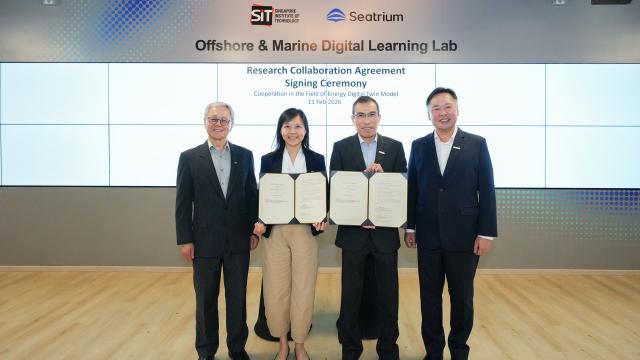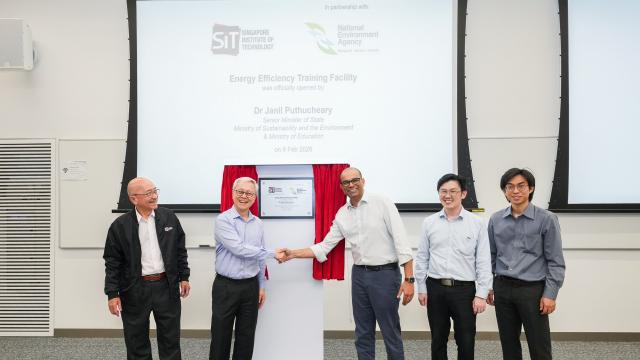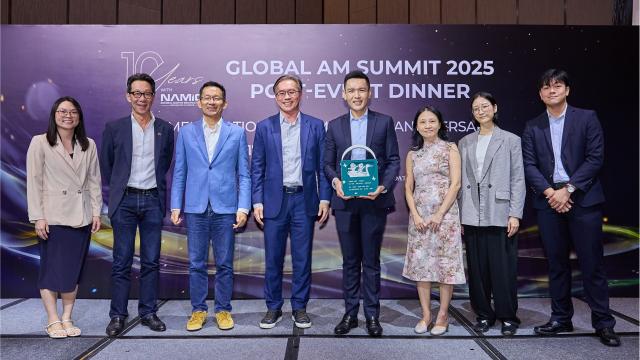As the workforce transforms, higher education must evolve with it. At the 2025 Applied Learning Conference held at SIT’s Punggol Campus for the first time, participants explored how a shift from traditional teaching to skills mastery can prepare both learners and workers for a future of continuous transformation.
With artificial intelligence disrupting industries at breakneck speed, the value of human and hands-on skills has never been more evident. As Geoffrey Hinton – known as the “godfather of AI” – once remarked, “A good bet would be to become a plumber,” underscoring the staying power of applied skills in an increasingly automated world.
This sentiment was widely echoed by speakers at the Applied Learning Conference (ALC) held on 2 and 3 July 2025. The event, which drew close to 700 participants – mostly educators and industry partners – was graced by Senior Minister of State for Education, Dr Janil Puthucheary.

SMS Janil Puthucheary gave the opening address at the ALC, held at SIT’s Punggol Campus. (Photo: SIT)
Having the right skills is no longer enough – they must be constantly updated to keep pace with rapid economic shifts. According to the World Economic Forum’s “The Future of Jobs Report 2025”, two-fifths of workers’ existing skill sets will become outdated by 2030.
This reality calls for a mindset shift towards learning that must begin before employment.
“Universities are struggling to keep up with the pace of industry change. We must align faster and stay relevant, ” said Professor John Thong, Deputy President (Academic) and Provost of SIT. To tackle this, institutions like SIT, for instance, have long adopted an applied learning approach, emphasising industry readiness and transferable skills in their graduates. In fact, one in two SIT students receives advance offers from the companies where they intern.

Prof Thong highlighted the importance of aligning education with industry needs for a future-ready workforce. (Photo: SIT)
Themed “Navigating the Future: Competency-based Education for a Skills-Ready Workforce”, the conference centred on the need for institutes of higher learning (IHLs) to adapt their pedagogies to equip students with future-ready skills. “Our aim is to ensure graduates hit the ground running upon graduation,” said SIT President Professor Chua Kee Chaing in a fireside chat with Martin Betts, CEO and co-founder of HEDx, a global initiative focused on improving higher education.

Prof Chua and Martin Betts discussed advancing applied learning and competency-based education in a fireside chat. (Photo: SIT)
An Ecosystem of Lifelong Learning
Traditional models of education are becoming increasingly limited in preparing students for today’s workforce.
There is a significant skills mismatch between what employers require of employees and what graduates have studied during university. And with shorter business cycles, companies can no longer afford to spend months training fresh graduates from scratch.
“Skills validation is no longer a nice-to-have. It has become essential,” Prof Thong said.
Instead of “frontloading” education and expecting students to acquire all the knowledge they need before entering the workforce, IHLs should embrace a lifelong learning model that supports continuous skills development throughout their careers.

Close to 1,000 educators and industry leaders packed the SIT Ho Bee Auditorium over two days. (Photo: SIT)
More recently, SIT has introduced two new competency-based undergraduate programmes in Engineering. Under this model, the programmes are co-designed by industry partners. Students progress after demonstrating mastery of specific skills or concepts, not just after completing a module.
“The assessments are not just theoretical but something that students can relate to in the workplace,” said Associate Professor Eugene Wong, Director of Programmes, Engineering Cluster, in a breakout session on designing skills-based curricula.
Under this model, students not only demonstrate mastery of specific competencies; they also earn “micro-credentials,” which are clusters of modules aligned with particular skills. These are stackable, allowing learners to build towards a full degree or specialist certificates, catering to part-time adult learners. “We had a 68-year-old learner who came back knowing what he wants to pursue,” said A/Prof Venkat Neelakantam at the same session, adding that learners are also credited for prior certifications to avoid repeating content unnecessarily.
Other IHLs are moving in the same direction, too. Nanyang Polytechnic, for instance, has introduced the Professional Competency Model, which aims to mirror workplace learning, said speakers Dr Tay Mia Eng and Ms Tai Kee Lian, who led its implementation. “We designed it such that learning takes place just in time, just like at the workplace,” Dr Tay said.
Ultimately, these programmes “blur the divide between pre-employment training and continuing training”, said Prof Chua.

At a panel discussion moderated by SIT’s Assistant Provost (Applied Learning) A/Prof May Lim (extreme left), international experts (from L-R) Tracey Donnery, Patrick Kidd, Gog Soon-Joo and Martin Betts discussed global approaches to future skills development, showcasing collaborative efforts between governments, industries, and education providers to tackle evolving workforce needs. (Photo: SIT)
The Hardiness of Human Skills
The thing is: hard technical skills are evolving constantly. What will remain timeless and invaluable are skills that set humans apart from AI, like communication and critical thinking.
The conference featured plenary sessions and panel discussions with thought leaders from various sectors. Notably, Jacqueline Poh, CEO of JTC Corporation, emphasised the increasing value of roles requiring human empathy and judgment. “The more jobs that AI can replace get replaced by AI, the more jobs that need a human touch will command a premium,” she shared.
She added that jobs of the future will be “high touch, high tech and high trust”, referring to roles that rely on human empathy and judgment. These include jobs in the care economy, such as nurses and teachers, or leadership positions like corporate executives.

Jacqueline Poh, CEO of JTC Corporation, spoke on building skills and ecosystems for Singapore’s future economy. (Photo: SIT)
This is why SIT now issues a transferable skills transcript alongside the regular academic transcript as part of its holistic education, recognising 18 core skills students have attained.
Asked about SIT’s direction over the next decade, Prof Chua said: “We aim to become a platform university that works to address the needs of industry and aspirations of learners, not just relying on developing everything in-house but working with the entire ecosystem.”















![[FA] SIT One SITizen Alumni Initiative_Web banner_1244px x 688px.jpg](/sites/default/files/2024-12/%5BFA%5D%20%20SIT%20One%20SITizen%20Alumni%20Initiative_Web%20banner_1244px%20x%20688px.jpg)


